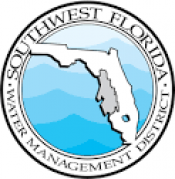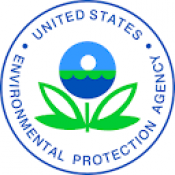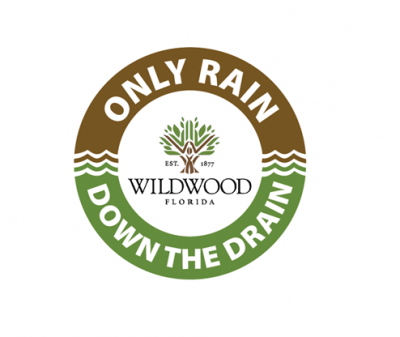Stormwater
City of Wildwood Stormwater
WHAT IS STORMWATER POLLUTION?
The United States Environmental Protection Agency (EPA) defines stormwater as water that occurs after a rainfall event, and flows over hardened or impervious surfaces, such as rooftops, driveways, sidewalks, and parking lots.
In developed areas, these surfaces prevent the water from naturally absorbing into the ground. As the water travels into the stormwater drainage system, it can collect oil, chemicals, bacteria, sediment, pet waste, trash, and other pollutants. It is important to know stormwater systems are not connected to sanitary sewer systems.
Once the water enters the stormwater drainage system, these pollutants or illicit discharges can contaminate Florida’s natural resources such as ponds, lakes, wetlands, oceans, and our drinking water!
LEARN WHAT YOU CAN DO TO PREVENT STORMWATER POLLUTION!
Pollutants or illicit discharges that enter into the City’s stormwater drainage system are in violation of Stormwater Ordinance 2022-59.
No person shall discharge or cause to be discharged into the municipal storm drain system or watercourses any materials, including but not limited to pollutants or waters containing any pollutants that cause or contribute to a violation of applicable water quality standards, other than stormwater.
Protect our environment from these types of pollution by following simple Best Management Practices.
Best Management Practices (BMP) is a practice, or combination of practices, that is determined to be an effective and practicable means of preventing or reducing the amount of pollution generated by nonpoint sources to a level compatible with water quality goals.
Healthy Habits for Clean Water
Recycle or properly dispose of household products that contain chemicals such as insecticides, pesticides, paint, solvents, used motor oil and other auto fluids. Do not pour them onto the ground or into storm drains.
Purchase and use nontoxic, biodegradable, recycled, and recyclable products whenever possible.
Reduce the amount of paved area and increase the amount of vegetated area in your yard. Use native plants in your landscaping to reduce the need for watering during dry periods. Consider directing downspouts away from paved surfaces onto lawns and other measures to increase infiltration and reduce polluted runoff.
Flushing pet waste is the best disposal method. Leaving pet waste on the ground increases public health risks by allowing harmful bacteria and nutrients to wash into the storm drain and eventually into local waterways.
Do not blow lawn clippings into the street or down the storm drain. Blow back onto the lawn or into a bed as free mulch fertilizer.
Use pesticides and fertilizers sparingly. When use is necessary, use these chemicals in the recommended amounts, sweep up excess fertilizer from streets and driveways. Avoid application if the forecast calls for rain; otherwise, chemicals will be washed into your local waterways.
Check your car, boat, motorcycle, and other machinery and equipment for leaks and spills. Make repairs as soon as possible. Clean up spilled fluids with an absorbent material like kitty litter or sand, and don’t rinse the spills into a nearby storm drain. Remember to properly dispose of the absorbent material.
For information on how to dispose of your
hazardous household chemicals, contact:
Sumter County
Hazardous Waste Project Manager
Sumter County Public Works
319 East Anderson Ave. • Bushnell, FL 33513
(352) 793-0240 • fax (352) 793-0247
To report illegal disposal of
hazardous chemicals call:
City of Wildwood Public Works Department
352-330-1343
For information on local oil recycling sites,
call 1-800-741-4337.
For information on local collection sites
for biomedical waste items,
call your local county health department.
Florida Department of Health in Sumter County - Main Location
415 East Noble Avenue
Bushnell, FL 33513
Did you know our most valuable resource is protected under the “Clean Water Act” Please visit the United States Environmental Protection Agency (EPA) and learn more.
U.S. Environmental Protection Agency | US EPA
Summary of the Clean Water Act | US EPA
You may also learn more about preserving Florida’s water resources from the Southwest Florida Water Management District (SWFWMD)
2379 Broad Street
Brooksville, FL 34604
352-796-7211
|
Only Rain Down the Drain! The city participates in the National Pollutant Discharge and Elimination System (NPDES) permitting program. This is a Federal program, administered by the Florida Department of Environmental Protection (FDEP). As a participant of the NPDES, the city is required to adhere to several Best Management Practices (BMP’s). These BMP’s are designed to educate the public about surface water quality and improve the discharge of stormwater runoff. The goal of the program is to improve the environment through the protection of our local water resources. Volunteer to mark designated storm drains with “ONLY RAIN DOWN THE DRAIN.” Get involved, learn the importance of our local water resources and the environment. |
Stormwater Ponds
What are stormwater ponds and why do we need them?
|
A stormwater pond is designed to collect and manage runoff from rainwater. When rainwater lands on rooftops, parking lots, streets, driveways and other hard surfaces, the rainfall that doesn’t soak into the ground (stormwater runoff) flows into your neighborhood stormwater pond through grates, pipes, shallow swales, or ditches. Stormwater ponds are required for most new development (since the 1980s) and are specifically designed to help prevent flooding and remove pollutants from the water. Without these ponds, stormwater would carry pollutants like litter, motor oil, gasoline, fertilizers, pesticides, pet wastes, sediments, and anything else that can float, into nearby streams, rivers, lakes, wetlands, estuaries, or oceans. |



